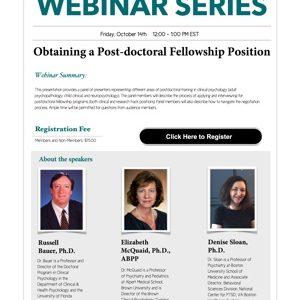ASSESSMENT CE SERIES: Increasing the impact of your psychological assessments: Insights from Collaborative/Therapeutic Assessment
$10.00
Presenter: Stephen E. Finn, Center for Therapeutic Assessment, Austin, TX
Brief Description:
Psychological assessment continues to be one of the core activities of psychologists across a number of domains of practice, e.g., education, clinical, counseling, industrial-occupational, forensic (Evans & Finn, 2017). Multiple research studies have documented the benefits to clients when psychologists incorporate collaborative practices and values into their assessments (De Saeger et al., 2014; De Saeger et al., 2016; Durosini & Aschieri, 2021; Poston & Hanson, 2010; Smith et al., 2014). Such benefits include decreases in symptomatology and increases in self-esteem (Durosini & Aschieri, 2021), greater satisfaction with psychological assessment (De Saeger et al., 2016), and increased alliance in subsequent psychotherapy (Hilsenroth et al., 2004), among others. In this webinar, Dr. Finn will discuss four empirically supported collaborative practices that assessors working in various fields of assessment could use with clients: 1) providing Interactive vs. “delivered” feedback about assessment findings (Hanson et al., 1997). 2) inviting clients to help delineate the goals of the assessment (Finn & Tonsager, 1992), 3) asking clients to reflect on their own test responses and experiences after standard test administration (De Saeger et al., 2016), and 4) giving clients written feedback in a form they can comprehend (De Saeger et al., 2016; Lance & Krishnamurthy, 2003; Tharinger & Pilgrim, 2011). Dr. Finn’s emphasis will be mainly on adult assessment, but he will also briefly discuss psychological assessments of children and of adolescents. The main goal of this webinar is to help practicing psychologists understand how to increase the impact of their psychological assessments in ways they could easily implement. Dr. Finn will also discuss common restraining forces (both external and internal) to working more collaboratively when doing psychological assessment, and how to address these concerns.
Learning Objectives:
At the end of the webinar, participants will be able to:
- list 4 empirically supported ways to make psychological assessment more impactful for clients.
- name at least 3 potential blocks to working more collaboratively with clients.
- discuss ways to address blocks to collaborative psychological assessment.
Description
Presenter: Stephen E. Finn, Center for Therapeutic Assessment, Austin, TX
Brief Description:
Psychological assessment continues to be one of the core activities of psychologists across a number of domains of practice, e.g., education, clinical, counseling, industrial-occupational, forensic (Evans & Finn, 2017). Multiple research studies have documented the benefits to clients when psychologists incorporate collaborative practices and values into their assessments (De Saeger et al., 2014; De Saeger et al., 2016; Durosini & Aschieri, 2021; Poston & Hanson, 2010; Smith et al., 2014). Such benefits include decreases in symptomatology and increases in self-esteem (Durosini & Aschieri, 2021), greater satisfaction with psychological assessment (De Saeger et al., 2016), and increased alliance in subsequent psychotherapy (Hilsenroth et al., 2004), among others. In this webinar, Dr. Finn will discuss four empirically supported collaborative practices that assessors working in various fields of assessment could use with clients: 1) providing Interactive vs. “delivered” feedback about assessment findings (Hanson et al., 1997). 2) inviting clients to help delineate the goals of the assessment (Finn & Tonsager, 1992), 3) asking clients to reflect on their own test responses and experiences after standard test administration (De Saeger et al., 2016), and 4) giving clients written feedback in a form they can comprehend (De Saeger et al., 2016; Lance & Krishnamurthy, 2003; Tharinger & Pilgrim, 2011). Dr. Finn’s emphasis will be mainly on adult assessment, but he will also briefly discuss psychological assessments of children and of adolescents. The main goal of this webinar is to help practicing psychologists understand how to increase the impact of their psychological assessments in ways they could easily implement. Dr. Finn will also discuss common restraining forces (both external and internal) to working more collaboratively when doing psychological assessment, and how to address these concerns.
Learning Objectives:
At the end of the webinar, participants will be able to:
- list 4 empirically supported ways to make psychological assessment more impactful for clients.
- name at least 3 potential blocks to working more collaboratively with clients.
- discuss ways to address blocks to collaborative psychological assessment.






Reviews
There are no reviews yet.